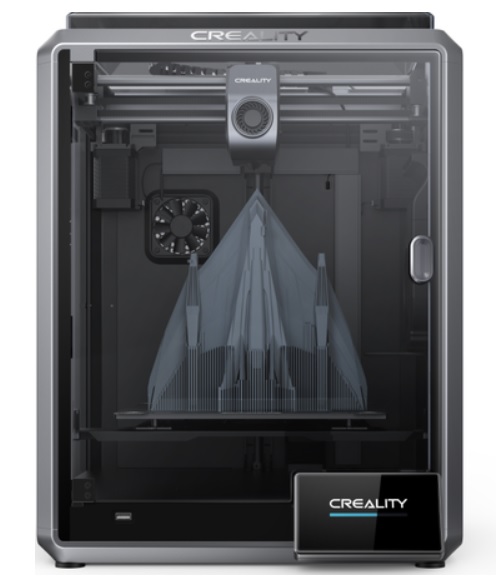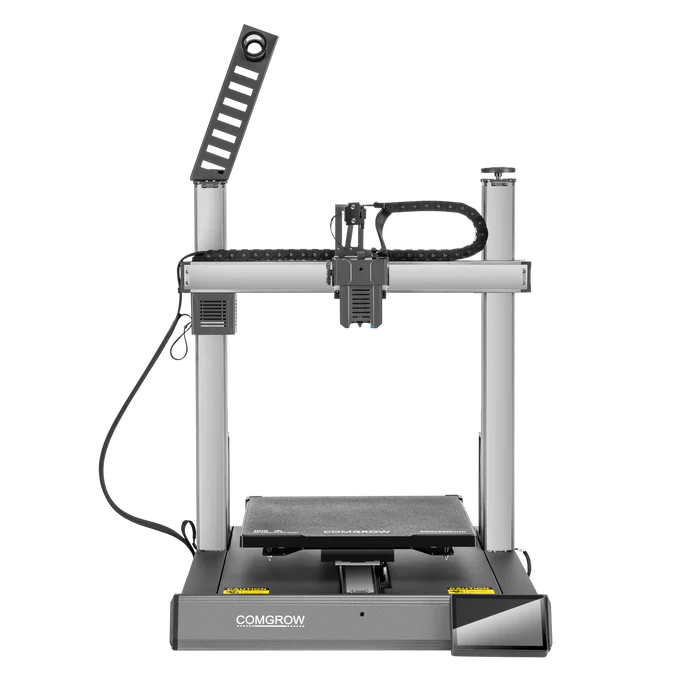Compare K1 vs Comgrow T300
Comparison between the best 3D printers
Choose the best 3D printer at the best price. The cheapest 3D printers are here.
Buy a 3D printer here with 3D Fila.
 |
 |
|
| Model | K1[BUY K1] |
Comgrow T300 |
| Printing Material | Filament | Filament |
| Buy Filament for Creality 3D K1 | Buy Filament forSovol Comgrow T300 | |
| Estimated price | $399,00 | $449,00 |
| Manufacturer | Creality 3D | Sovol |
| Release Year | 2023 | 2024 |
| Print Volume [mm] | 220x220x250 | 300x300x350 |
| Printer Size [mm] | 355x355x480 | 503x631x831 |
| Weight [kg] | 12,5 | 17 |
| Power Loss Recovery | YES | YES |
| Enclosed printer | YES | NO |
| Bed Leveling | Automatic | Automatic |
| Filament End Sensor | YES | YES |
| Bed type | Heated | Heated |
| Power supply system | Direct Drive | Direct Drive |
| Standard nozzle | 0,4 | 0,4 |
| Maximum Nozzle Temperature [°C] | 300 | 300 |
| Maximum Bed Temperature [°C] | 120 | 100 |
| Maximum printing speed [mm/s] | 600 | 600 |
| Filament holder | YES | YES |
| Camera for supervision | YES | YES |
| Recommended filaments | ABS, PLA, PETG, PET, TPU, PA, ABS, ASA, PC, PLA-CF, PA-CF, PET-CF | PLA, PETG, PET, TPU, PA, ASA, PC, PLA CE, PA-CF, PET-CF |
| Recommended slicers | Creality Print; Cura, Simplify3D e PrusaSlicer | Bambu Studio, Super Slicer, Cura, Prusa Slicer, Orca Slicer |
| Maximum Resolution [mm] | 0,1 | 0,1 |
| Processor | 64 bit | |
| Display | Display touchscreen 4,3'' | Touchscreen 5'' |
| Power Supply | 110/220V / 350W | 150 W |
| Connectivity | Ethernet / USB / Wi-Fi | USB, WiFi |
| Operating systems | Windows, Mac, Linux | Windows, Linux, Macbook |
| Date of registration in the system | 2023-04-17 | 2024-05-10 |
| Release date | 2023 | 2024 |
| Extra features | The K1 is an extremely fast FDM 3D printer, reaching 600mm/s, 12 times faster than standard models. Equipped with a Core XY system and lightweight print head, it offers energy efficiency and high print quality. It stands out for its dual-gear extruder and quickly heated hotend, as well as dual cooling to prevent warping. Its robust structure ensures stability at high speed, with optimized software to speed up the printing process. | The Sovol Comgrow T300 printer stands out for its technological innovations and advanced features. With a print size of 300mm300mm350mm, the T300 offers true linear rails on all axes, ensuring greater stability. Its Klipper-based intelligent core and 64-bit microcomputer increase printing speed and quality through pressure advancement and input shaping. The extruder with a gear ratio of 6.5:1 allows for more precise material control, optimizing the printing of flexible materials. In addition, the T300 features a rapid filament cooling system with a high-speed fan and a circular duct piece that improves cooling efficiency. With a 4.3-inch high-refresh rate touchscreen and an 81-point automatic leveling system, the T300 simplifies the preparation and execution of 3D prints. |
| Support for multiple colors and materials (AMS and CFS) | NO | NO |
Notes * |
||
| Cost-benefit | 7 / 10 | 7 / 10 |
| Hardware | 4.2 / 10 | 3.2 / 10 |
| Tela | . | . |
| Print volume | 3 / 10 | 4 / 10 |
| Performance | 5 / 10 | 5 / 10 |
| [BUY K1] |
Conclusion |
| In comparing the Creality K1 and the Sovol Comgrow T300 3D printers, several key factors emerge that highlight their respective strengths and weaknesses. **Price vs. Features**: The K1 is the more budget-friendly option, providing essential features such as automatic bed leveling, power loss recovery, and a heated bed, all at a lower cost. In contrast, the T300, while slightly more expensive, offers a larger print volume and advanced features like true linear rails and a Klipper-based intelligent system, which may appeal to users looking to invest in more sophisticated technology for enhanced print quality and stability. **Print Volume**: The Comgrow T300 excels in terms of print volume, offering a significantly larger workspace, which can accommodate larger projects. The K1, while smaller, compensates with its high-speed printing capabilities. **Build Quality and Design**: The enclosed design of the K1 provides advantages for temperature control during printing, which can lead to better results with certain materials. The T300, while not enclosed, features a robust structure and advanced cooling capabilities that cater to precision and versatility, especially when working with flexible filaments. **User Experience**: Both printers are equipped with touchscreen interfaces and connectivity options, though the T300 boasts a slightly larger screen and more advanced leveling system, enhancing user interaction and ease of use. **Performance and Speed**: Both printers achieve comparable maximum printing speeds, but the K1’s design optimizes high-speed performance through its lightweight print head and dual cooling systems, making it ideal for rapid prototyping. In conclusion, the choice between the K1 and T300 ultimately depends on the specific needs of the user. The K1 is attractive for those prioritizing speed, reliability, and cost-effectiveness, while the T300 is better suited for users who require a larger print area and advanced technological features, even at a higher price point. Both options deliver strong performance and features, making either a solid choice based on user preferences and project requirements. |

